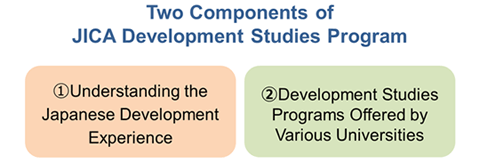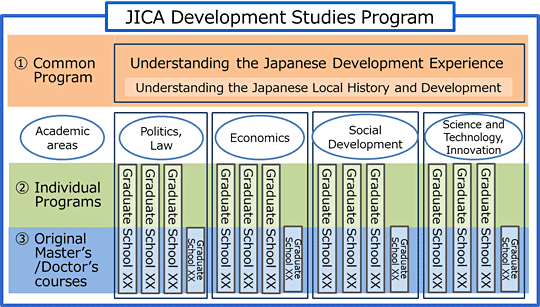JICA-DSP is being carried out by JICA as part of official development assistance (ODA) by the government of Japan. JICA-DSP is offered for international scholars accepted as the participants of JICA’s Human Resource Development Project, hereinafter referred to as “JICA scholars”, who are enrolled in a degree program at a Japanese university.


1. Common Program:Understanding the Japanese Development Experience/ the Japanese Local History and Development
JICA and cooperating universities provides JICA scholars with the opportunity to learn about Japan’s modernization and its development history. Through the a) Classroom Program and b) Online Lecture Series. Also, JICA provides c) Local Program, which enables JICA scholars to deeply understand Japanese development experiences through learning its local history and development. An overview of each program is shown below.
a) Classroom Program
Partner:
National Graduate Institute for Policy Studies (GRIPS), International University of Japan (IUJ)
Approach:
5-day intensive program during summer/winter break
Contents:
Lecture (Modern History of Japan, Japanese Politics, Economic History of Japan, etc.)
Special lecture
Field trip
Group discussion
b) Online Lectures Series
Partner:
The Open University of Japan
Approach:
Online lectures (45min./lecture)
Contents:
Seven Chapters on Japanese Modernization
| Lecture Titles | Lecturers (title as at the time of production) |
|---|---|
| Chapter 1. Meiji Revolution: Start of Full-Scale Modernization | Dr. Kitaoka Shinichi, President, JICA |
| Chapter 2. Rise and Fall of the Party Politics in Japan | Prof. Iokibe Kaoru, the University of Tokyo |
| Chapter 3. Japan after World War II | Prof. Tanaka Akihiko, President, GRIPS |
| Chapter 4. Economic Growth and Japanese Management | Prof. Itami Hiroyuki, President, International University of Japan |
| Chapter 5. Educational Development in Modernization in Japan | Dr. Kayashima Nobuko, Senior Vice President, JICA |
| Chapter 6. From ‘Asia and Japan’ to ‘Japan in Asia’ | Dr. Shiraishi Takashi, President, Prefectural University of Kumamoto |
| Chapter 7. A Japanese Approach to International Cooperation | Prof. Kato Hiroshi, International University of Japan |
c)Local Program
Partner:
Japanese Local Government, Local Universities, etc.
Approach:
Short (one or a few days) program (each JICA domestic office provides the program)
Contents:
Lecture (Japanese Local History and Development)
Field trip
- Promotion Video: “Local Program“ Understanding the Japanese Local History and Development (External Link: YouTube)
- Experience of joining “Seminar on Regional Understanding -Evolving Issues toward Improvement of the Lake Biwa Regional Understanding” Organized by JICA Kansai (November 2020)
- The JICA-DSP Local Program in the field of Private Sector “Epson's history of Community-based Development” -Organized by JICA Tokyo (February 2023)
- The JICA-DSP Local Program for learning about the Ainu Culture & the utilization of the natural environment -Organized by JICA Obihiro (March 2023)
- The JICA-DSP Local Program "Tour in Hiroshima, the Setting of the 49th G7 Summit" -Organized by JICA Chugoku (September 2023)
2. Development Studies Programs Offered by Various Universities
“Development Studies Programs Offered by Various Universities” have been established among the graduate school degree courses of the universities taking part in the JICA-DSP. It consists of class subjects pertaining to the development experience of modern Japan (including the experience of Japan’s own development, and of its cooperation to other countries through ODA).
Aim of “Development Studies Programs Offered by Various Universities” is to help JICA scholars to deepen understanding of Japan’s development experience in the respective academic fields through the class subjects of each university.
These subjects are established as a course open to students other than JICA scholars.
See below for universities which establish “Development Studies Programs Offered by Various Universities (Individual Programs)” under the JICA-DSP
It encompasses a broad range of fields that include politics and law, economics and finance, social development, science and technology, and innovation.
Four Academic Areas and Examples of Field
| Academic Areas | Examples of Field |
|---|---|
| Academic Area (1) Politics, Law | Politics, Law, Governance, etc. |
| Academic Area (2) Economics | Economics, Finance, Industrial Development, Management, etc. |
| Academic Area (3) Social Development | Education, Health, Land Development, Agricultural Economics, Environment, Disaster Risk Reduction, etc. |
| Academic Area (4) Science and Technology, Innovation | Engineering, Science, Agricultural science, Medical Science, IT, Manufacturing Technology, etc. |
University’s initiatives focused on understanding the development experience of modern Japan
The university’s initiatives under each of the four academic areas are introduced below. (Title as at the time of sharing these good practices in 2019.)
Academic Area (1) Politics and law and Academic Area (2) Economics
National Graduate Institute for Policy Studies (GRIPS)
Prof. Akihiko Tanaka, President
The National Graduate Institute for Policy Studies (GRIPS) contributes to the JICA-DSP through its leadership program, Global Governance Program (G-Cube).* While retaining and leveraging G-Cube’s core elements, we have updated some of the content to place more focus on development studies, particularly the endeavor of deriving universal theories from the experiences of Japan and other Asian countries in national development. Those who enroll in the G-Cube program will learn about Japan’s successes and failures through learning about the country’s economic development, the history of Japanese diplomacy in the country’s modern period, and how Japan’s experience in national development compares with that of other Asian countries. We plan to use the data and other resources yielded from other large projects as teaching materials and as subject matter for dissertations.
In Japan, university courses that are delivered in English tend to rely on Western textbooks and Western case studies. Without being nationalistic, I believe that such courses should try to use more Japanese case studies to develop universal, generalizable theories. This approach would help advance the level of research.
- *The aim of G-Cube is to foster what GRIPS calls “leaders of leaders”—individuals who can bring together the leaders of each field and channel their knowledge into solving major world issues. To that end, leaders of leaders use big-picture thinking to coordinate and reconcile disparate values and interests.
International University of Japan (IUJ)
Prof. Hiroyuki Itami, President
In conjunction with JICA-DSP, the International University of Japan has launched the Japan-Global Development Program (JGDP). The JGDP is a novel post-graduate program. Leveraging the flexibility enabled by the university’s relatively small size, it spans—and combines the resources of—multiple graduate schools.
Through the JGDP, attendees will learn about Japan’s experience in national development. They will also develop theoretical frameworks for explaining how and why Japan’s national development path differed from that of Western nations. The ultimate aim of JGDP is to develop such theoretical perspectives and share them with a global audience. Every success story has an underlying, theoretical framework to be identified. In exploring what underlies Japan’s success in establishing itself as a modern nation, those attending the program will take an inductive case-study approach, examining specific historical cases and deriving a general theory from them (just as one would extract essential oil from plants). They will then share their theories about Japan with the worldwide academic community. It is my hope that these theories will be extrapolated and applied to cases around the world.
Academic Area (3) Social Development
Hokkaido University
Dr. Toyoharu Nawa, President
Hokkaido University runs two development-studies programs, which fall under the the JICA-DSP (development-studies programs offered at participating universities). The first program links the university’s School of Agriculture, School of Engineering, and two of its other graduate schools. It examines case studies of regional development and international cooperation focusing on Hokkaido and how settlers managed to develop this northernmost region over a short period of time, overcoming the challenges posed by its harsh climate. The second program focuses on environmental issues. Those attending the program will learn about the background and causes of pollution, the legislative efforts in place to address these problems, and the process for creating technologies to preserve the environment. The ultimate aim of both programs is to equip graduates with essential knowledge about Japan’s modernization process after the start of the Meiji era and the ability to apply this knowledge to solve global development challenges.
Alongside the two programs, Hokkaido University runs the Science and Technology Research Partnership for Sustainable Development (SATREPS). Built on the university’s longstanding collaboration with JICA in international cooperation, SATREPS forms part of our mission to make the university a world-class center for education and research and contribute to the development of Hokkaido Prefecture. Furthermore, we are building an international network of academics through the education and research we provide as part of JICA-DSP, as well as through our own ambassador-partner system. In this way, we are furthering the progress of long-standing cooperation through a Japanophile community of equal relations.
Academic Area (4) Science and Technology, Innovation
Toyohashi University of Technology
Dr. Takashi Onishi, President
As part of the JICA-DSP, Toyohashi University of Technology has launched a new course, Japanese Industrial Technologies and Innovations. Those who attend this course will learn about a broad spectrum of Japanese industrial technology, with lectures delivered by the university’s faculty as well as by researchers from the private sector. This course does more than simply showcase Japan’s exceptional industrial technology; it aims to deepen students’ understanding of the values underpinning this technology and the sources of its competitive power. To that end, those attending the course will explore a plethora of case studies illustrating the Japanese thinking and ethos through behind-the-scenes story, the history of these technologies, the relevant organizational frameworks and organizational culture, the techniques used to resolve problems, Japanese approaches to business administration, and the role of science and technology. By underscoring the ingenuity and hard work that gave rise to industrial technologies, these case studies should provide students with many insights for promoting technological development in developing countries amid the many constraints these countries face.
In this way, Industrial Technology Theory aims to equip graduates with knowledge about Japan’s expertise in R&D and industrial technology. With this knowledge, graduates can not only play a core role in helping their country develop; they can also work alongside Japanese experts on cross-border solutions or pursue careers in Japan’s industrial sector, thereby deepening ties between Japan and other countries.




scroll